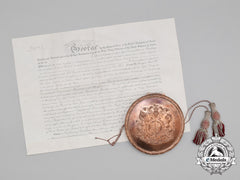
LOADING ...
In response to evolving domestic opinion, eMedals Inc has made the conscious decision to remove the presentation of German Third Reich historical artifacts from our online catalogue. For three decades, eMedals Inc has made an effort to preserve history in all its forms. As historians and researchers, we have managed sensitive articles and materials with the greatest of care and respect for their past and present social context. We acknowledge the growing sentiments put forth by the Canadian public and have taken proactive actions to address this opinion.
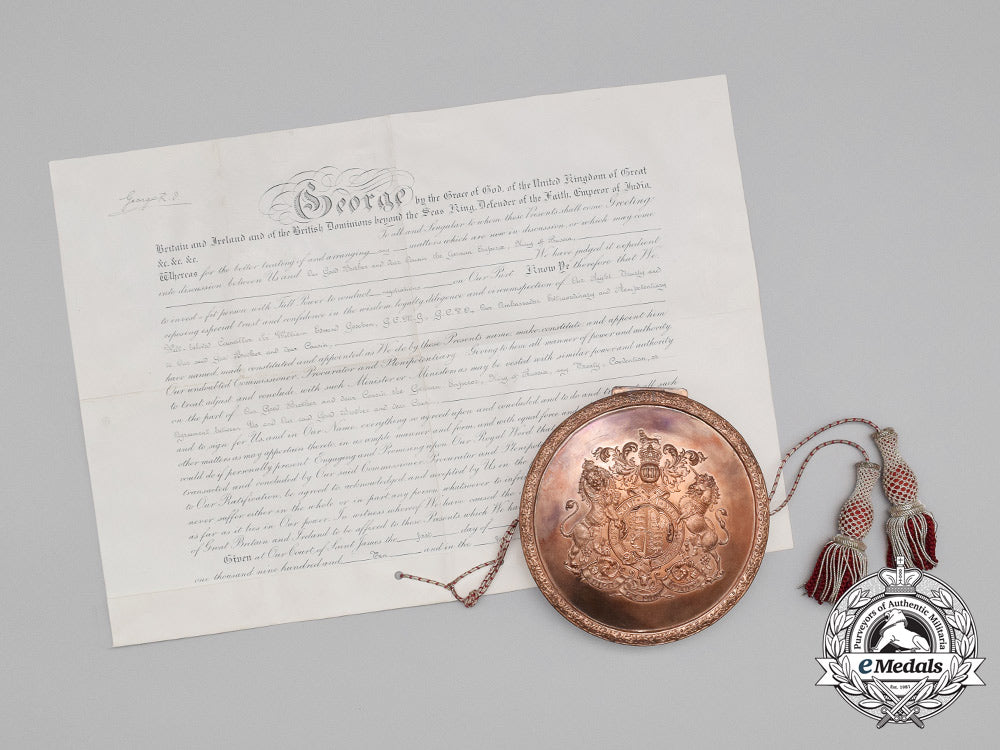
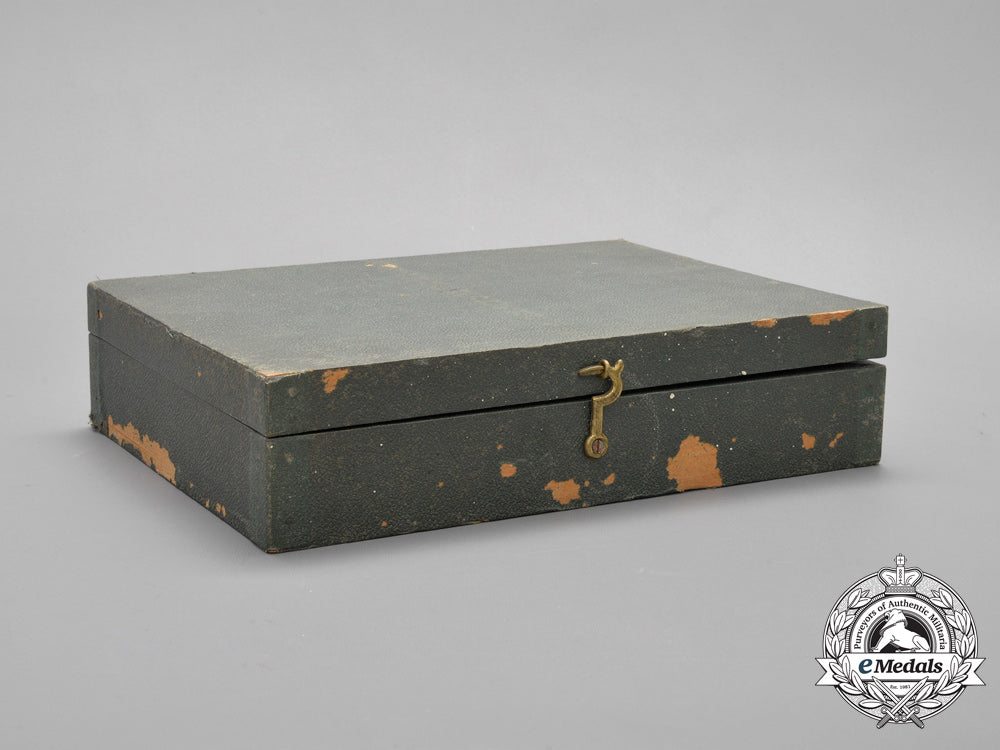
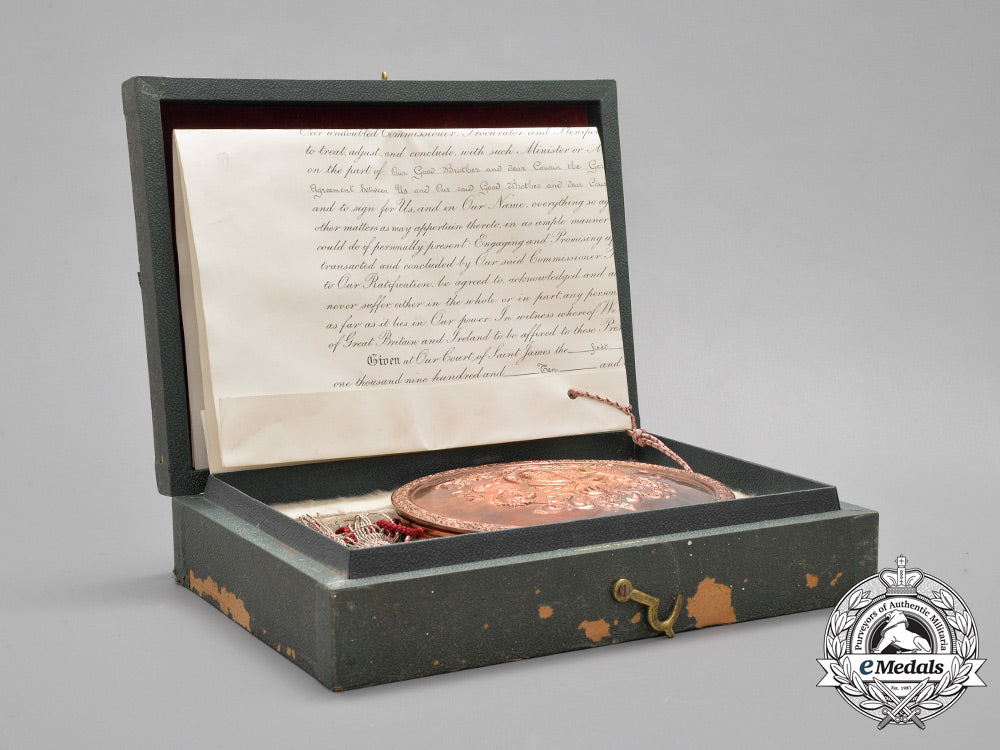

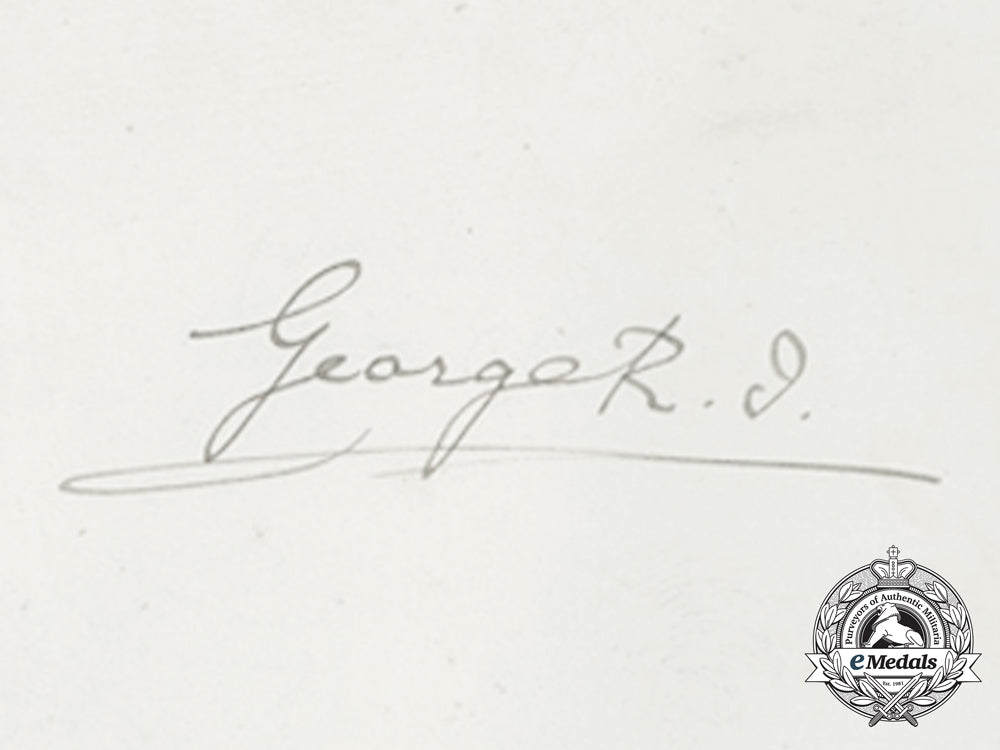
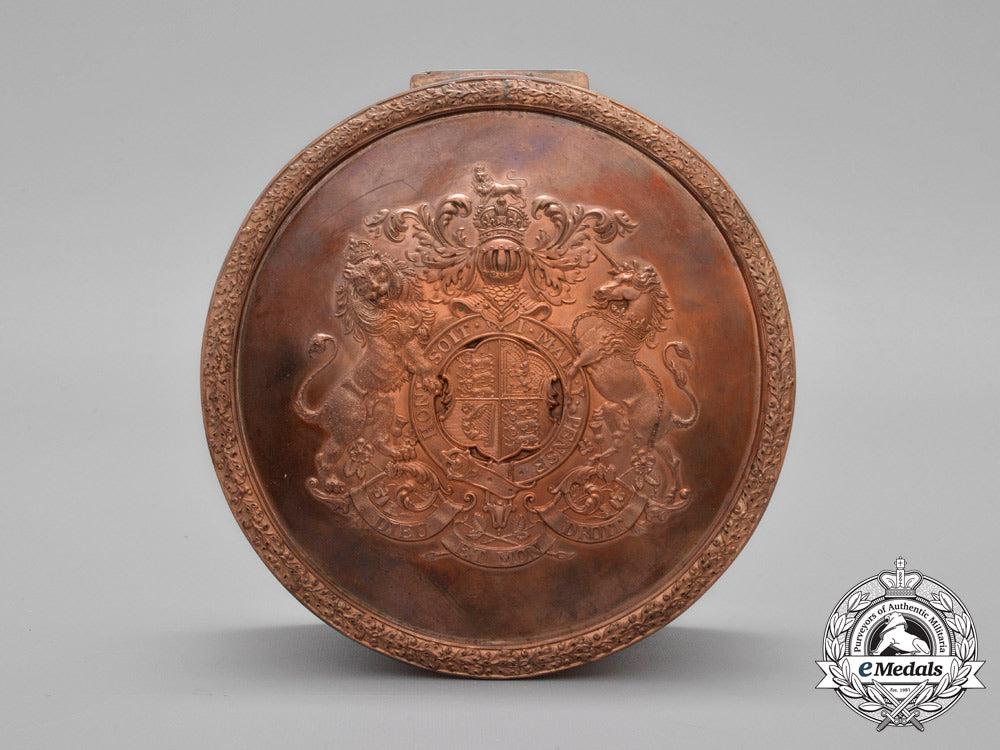
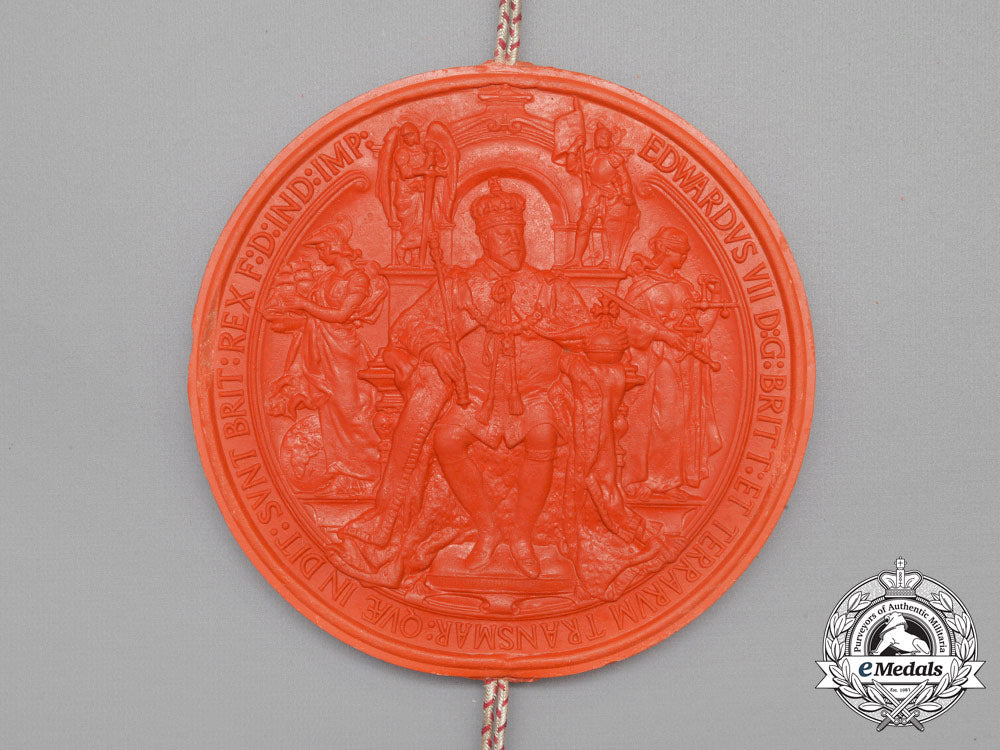

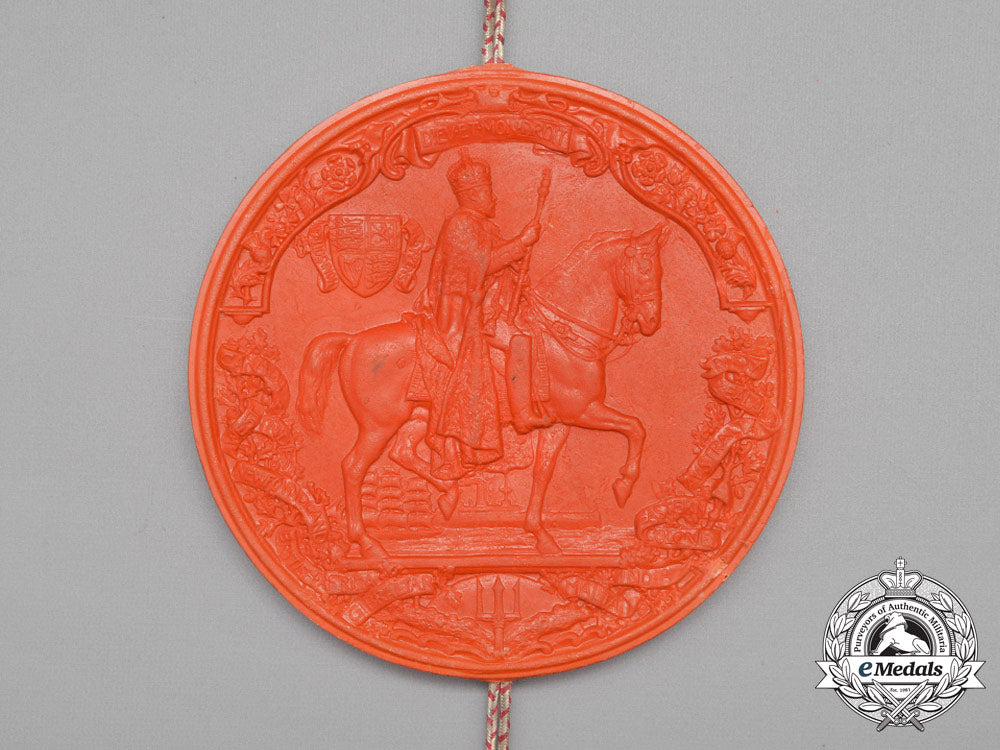
A Historic Appointment Document & Seal To The Ambassador At The Prussian Court 1910
A Historic Appointment Document & Seal To The Ambassador At The Prussian Court 1910
SKU: ITEM: GB6361
Current Bid:
Your Max Bid:
Bid History:
Time Remaining:
Couldn't load pickup availability
Shipping Details
Shipping Details
eMedals offers rapid domestic and international shipping. Orders received prior to 12:00pm (EST) will be shipped on the same business day.* Orders placed on Canadian Federal holidays will be dispatched the subsequent business day. Courier tracking numbers are provided for all shipments. All items purchased from eMedals can be returned for a full monetary refund or merchandise credit, providing the criteria presented in our Terms & Conditions are met. *Please note that the addition of a COA may impact dispatch time.
Shipping Details
eMedals offers rapid domestic and international shipping. Orders received prior to 12:00pm (EST) will be shipped on the same business day.* Orders placed on Canadian Federal holidays will be dispatched the subsequent business day. Courier tracking numbers are provided for all shipments. All items purchased from eMedals can be returned for a full monetary refund or merchandise credit, providing the criteria presented in our Terms & Conditions are met. *Please note that the addition of a COA may impact dispatch time.
Description
Description
Footnote: Sir William Edward Goschen, 1st Baronet GCB GCMG GCVO PC (July 18, 1847 - May 20, 1924) was a British diplomat. He was born at Eltham, England, the twelfth child and sixth son of Wilhelm Heinrich Göschen, originally of Leipzig, Saxony, and Henrietta Ohmann, who was born in London. At the time of his birth his father was 54. The Liberal Unionist politician Lord Goschen was Goschen's elder brother. He was educated at Rugby and Corpus Christi College, Oxford and twice represented Oxford at real tennis, played five matches of first-class cricket as a right-handed batsman for the University of Oxford and throughout his life was a keen sportsman. Goschen entered the Diplomatic Service in 1869 and after an initial few months at the Foreign Office he served in Madrid, as Third Secretary in Buenos Aires, Paris, Rio de Janeiro, Constantinople, Peking, Copenhagen as secretary to the legation (1888-1890), Lisbon as secretary to the legation, Washington (1893-1894) as secretary and Saint Petersburg (1895-1898). Goschen was offered the Belgrade legation and took up post in Serbia in September 1899. He was later to recall that his only instructions from the Foreign Secretary Lord Salisbury was to "keep [an] eye [on] King Milan". He remained in Serbia until 1900. According to Goschen himself he was initially less than happy to be offered the Copenhagen Legation. "Oh dear, oh dear! I am not thrilled and later accepted but with misgivings". He served as Minister to Denmark from 1900 until 1905 and although recognizing the posting as something of a diplomatic backwater, he at least revelled in the social aspects of his position. Goschen's appointment as Ambassador to Austria-Hungary was seemingly made at the behest of King Edward VII. Goschen most probably expected the Vienna posting to be his last but the imminent retirement of Sir Frank Lascelles at the Berlin embassy posed problems for the Foreign Secretary. Finding a successor for Lascelles was not easy. Berlin made it clear that Sir Arthur Nicolson would be unacceptable as the successor and although the Permanent Under-Secretary for Foreign Affairs, Charles Hardinge, had initially favoured Fairfax Cartwright, the Minister at Munich, he was in his turn, vetoed by the Germans, who wanted a public figure. Eventually a reluctant Kaiser was persuaded to accept Goschen. In Goschen's last conversation with the German Chancellor Theobald von Bethmann-Hollweg before asking for his passports, on August 4, 1914, Bethmann famously expressed his astonishment that England would go to war for "a scrap of paper" (the 1839 treaty guaranteeing Belgium's neutrality). During the First World War, Goschen established a relief fund for British citizens still living in Germany who had lost their means of income and for British Prisoners of War being held prisoner in Germany. The fund was primarily administered through the United States Consular Service (now the United States Foreign Service). Goschen was the recipient of four British decorations: Knight Grand Cross of the Order of the Bath in 1911 (GCB); Knight Grand Cross of the Order of St Michael and St George in 1909 (GCMG); Knight Commander of the Order of St Michael and St George on September 13, 1901 during a private visit to Denmark by King Edward VII and Queen Alexandra (KCMG); and Knight Grand Cross of the Royal Victorian Order in 1904 (GCVO). Goschen was admitted to the Privy Council in 1905 and was created a Baronet, of Beacon Lodge, Highcliffe, in the County of Southampton, in 1916. He was the recipient of three foreign decorations: Denmark: Grand Cross of the Order of Dannebrog; Austrian Empire: Grand Cross of the Order of Leopold; and Prussia: Grand Cross of the Order of the Red Eagle. In his personal life, Goschen married Harriet Hosta Clarke, an American from Michigan, in 1874. They had two sons, Edward Henry Goschen born in 1877 and George Gerard Goschen born in 1887. Lady Goschen died in February 1912. In later life, he became an enthusiastic, if untalented, violinist. He noted in his diary that he played duets with the German Crown Prince in 1910. Goschen died in Chelsea, London, on May 24, 1924, at the age of 76, and was succeeded in his title by his eldest son, Edward Henry Goschen. In regards to this document being signed by King George V and the seal bearing the images of King Edward VII, the discrepancy is easily explained. King Edward VII died on May 6, 1910. His son, the Prince of Wales, succeeded his father as king, as King George V and signed this document twenty-six days after the death of King Edward VII, on June 1st, therefore, not allowing time for a new seal to be constructed and issued with the image of the new king incorporated.
Description
Footnote: Sir William Edward Goschen, 1st Baronet GCB GCMG GCVO PC (July 18, 1847 - May 20, 1924) was a British diplomat. He was born at Eltham, England, the twelfth child and sixth son of Wilhelm Heinrich Göschen, originally of Leipzig, Saxony, and Henrietta Ohmann, who was born in London. At the time of his birth his father was 54. The Liberal Unionist politician Lord Goschen was Goschen's elder brother. He was educated at Rugby and Corpus Christi College, Oxford and twice represented Oxford at real tennis, played five matches of first-class cricket as a right-handed batsman for the University of Oxford and throughout his life was a keen sportsman. Goschen entered the Diplomatic Service in 1869 and after an initial few months at the Foreign Office he served in Madrid, as Third Secretary in Buenos Aires, Paris, Rio de Janeiro, Constantinople, Peking, Copenhagen as secretary to the legation (1888-1890), Lisbon as secretary to the legation, Washington (1893-1894) as secretary and Saint Petersburg (1895-1898). Goschen was offered the Belgrade legation and took up post in Serbia in September 1899. He was later to recall that his only instructions from the Foreign Secretary Lord Salisbury was to "keep [an] eye [on] King Milan". He remained in Serbia until 1900. According to Goschen himself he was initially less than happy to be offered the Copenhagen Legation. "Oh dear, oh dear! I am not thrilled and later accepted but with misgivings". He served as Minister to Denmark from 1900 until 1905 and although recognizing the posting as something of a diplomatic backwater, he at least revelled in the social aspects of his position. Goschen's appointment as Ambassador to Austria-Hungary was seemingly made at the behest of King Edward VII. Goschen most probably expected the Vienna posting to be his last but the imminent retirement of Sir Frank Lascelles at the Berlin embassy posed problems for the Foreign Secretary. Finding a successor for Lascelles was not easy. Berlin made it clear that Sir Arthur Nicolson would be unacceptable as the successor and although the Permanent Under-Secretary for Foreign Affairs, Charles Hardinge, had initially favoured Fairfax Cartwright, the Minister at Munich, he was in his turn, vetoed by the Germans, who wanted a public figure. Eventually a reluctant Kaiser was persuaded to accept Goschen. In Goschen's last conversation with the German Chancellor Theobald von Bethmann-Hollweg before asking for his passports, on August 4, 1914, Bethmann famously expressed his astonishment that England would go to war for "a scrap of paper" (the 1839 treaty guaranteeing Belgium's neutrality). During the First World War, Goschen established a relief fund for British citizens still living in Germany who had lost their means of income and for British Prisoners of War being held prisoner in Germany. The fund was primarily administered through the United States Consular Service (now the United States Foreign Service). Goschen was the recipient of four British decorations: Knight Grand Cross of the Order of the Bath in 1911 (GCB); Knight Grand Cross of the Order of St Michael and St George in 1909 (GCMG); Knight Commander of the Order of St Michael and St George on September 13, 1901 during a private visit to Denmark by King Edward VII and Queen Alexandra (KCMG); and Knight Grand Cross of the Royal Victorian Order in 1904 (GCVO). Goschen was admitted to the Privy Council in 1905 and was created a Baronet, of Beacon Lodge, Highcliffe, in the County of Southampton, in 1916. He was the recipient of three foreign decorations: Denmark: Grand Cross of the Order of Dannebrog; Austrian Empire: Grand Cross of the Order of Leopold; and Prussia: Grand Cross of the Order of the Red Eagle. In his personal life, Goschen married Harriet Hosta Clarke, an American from Michigan, in 1874. They had two sons, Edward Henry Goschen born in 1877 and George Gerard Goschen born in 1887. Lady Goschen died in February 1912. In later life, he became an enthusiastic, if untalented, violinist. He noted in his diary that he played duets with the German Crown Prince in 1910. Goschen died in Chelsea, London, on May 24, 1924, at the age of 76, and was succeeded in his title by his eldest son, Edward Henry Goschen. In regards to this document being signed by King George V and the seal bearing the images of King Edward VII, the discrepancy is easily explained. King Edward VII died on May 6, 1910. His son, the Prince of Wales, succeeded his father as king, as King George V and signed this document twenty-six days after the death of King Edward VII, on June 1st, therefore, not allowing time for a new seal to be constructed and issued with the image of the new king incorporated.









You May Also Like
Germany, HJ. A 1938 National Trade Competition Victor’s Badge, Gold Grade in Case, By Gustav Brehmer
G60096
Italy, Republic. An Order of Merit of the Italian Republic, Grand Cross Set by Johnson, 1970
EU23677
Spain, Franco Period. An Order of Civil Merit, Grand Cross Set
EU23731
Russia, Imperial. An Order of St. Anne, II Class in Gold
EU23720
Austria, Imperial. An Order of the Iron Crown, III Class in Gold, by Rothe, c.1900
EU23723
-
Germany, HJ. A 1938 National Trade Competition Victor’s Badge, Gold Grade in Case, By Gustav Brehmer
G60096
Add to CartRegular price $3,950 USDRegular price $0 USD Sale price $3,950 USDUnit price / per -
Italy, Republic. An Order of Merit of the Italian Republic, Grand Cross Set by Johnson, 1970
EU23677
Add to CartRegular price $950 USDRegular price $0 USD Sale price $950 USDUnit price / per -
Spain, Franco Period. An Order of Civil Merit, Grand Cross Set
EU23731
Add to CartRegular price $600 USDRegular price $0 USD Sale price $600 USDUnit price / per -
Russia, Imperial. An Order of St. Anne, II Class in Gold
EU23720
Add to CartRegular price $2,950 USDRegular price $0 USD Sale price $2,950 USDUnit price / per -
Austria, Imperial. An Order of the Iron Crown, III Class in Gold, by Rothe, c.1900
EU23723
Add to CartRegular price $3,950 USDRegular price $0 USD Sale price $3,950 USDUnit price / per
Do you have a similar item you are interested in selling?
Please complete the form and our client care representatives will contact you.
Sell Item






















